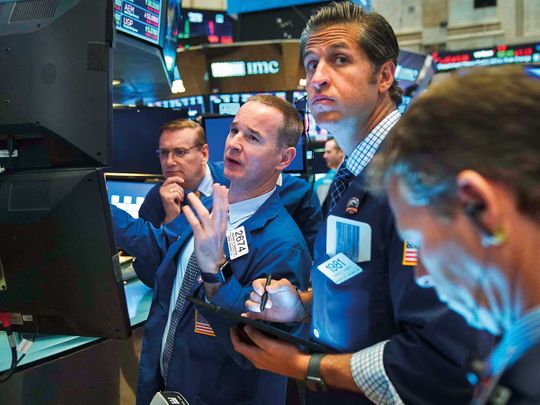
Dubai: After a momentary-but-major sell-off last week, investors will remain wary of any pandemic-related news in the week ahead as markets rein in an unrealistic rally momentum made in the past weeks.
Analysts expect stocks to be caught in a tug-of-war in the coming days, especially as investors weigh the potential positives of a reopening economy against worry that the coronavirus continues to spread.
Trailing one of the worst weeks in markets
Developed market equities had one of their worst weeks since the crash at the peak of the pandemic crisis as fears of a surge in new infections resurfaced and as the US Federal Reserve joined other central banks in warning that the V-shaped economic recovery priced in by markets may not materialize.
“While the Fed Chairman Jerome Powell was unequivocal in suggesting that interest rates are expected to remain low for the foreseeable future, he was less forthcoming on the pace of economic recovery,” explained Aditya Pugalia, Director of Financial Markets Research at Emirates NBD.
“Along with coronavirus-related developments, the major focus this week will remain on central banks.”
Investors eye more economic data this week
Even as the US Fed remains wary of a quick pick-up in activity in the world’s largest economy, investors will watch a raft of US data next week including retail sales and business inventories for more evidence of an economy on the mend.
The Bank of Japan, the Bank of England and the Swiss National Bank will set interest rates, along with central banks in Russia, Brazil, Taiwan and Indonesia.
Investors will also keep an eye on the meeting of European leaders this week to discuss and approve the 750 billion euro recovery fund proposed by the European Commission.
Fears of a slower-than-expected rebound linger
On Thursday, the Wall Street S&P 500 index, a key indicator of global markets, notched its biggest daily drop since mid-March after a cautionary economic forecast from the US Federal Reserve and concerns over a possible resurgence of COVID-19.
Analysts say that increased uncertainty over growth or the pandemic’s trajectory could push investors back into the growth companies that have delivered performance in recent months, even as the economy reeled from countrywide shutdowns.
Despite those concerns, some fund managers who have benefited from the jump in momentum stocks are becoming more cautious, expecting that value will soon regain favor.
The MSCI Arabian Markets index has dropped 15.3 per cent in the year so far, compared to a decline of 8.2 per cent in the MSCI World index and 11.5 per cent drop in the MSCI Emerging Markets index in the same period. The S&P Pan Arab Composite index lost 0.6 per cent last week.
“There are signs of primary market activity coming back to life in the region,” Pugalia added, referring to how Amlak International for Real Estate Finance has started its IPO in Saudi Arabia and BinDawood Holding is pushing ahead with plans to sell shares in its supermarket business on the Tadawul.
Dubai Financial Market (DFM) index dropped 0.5 per cent at 2,091 points, after falling as much as 2 per cent earlier in the session. The benchmark has now fallen for three out of the last four trading sessions.
The recent bout of weakness on the DFM comes after having rallied for six straight sessions in the sessions that preceded the current declines.
The Abu Dhabi Securities Exchange (ADX) slipped 0.4 per cent at 4,276 points, now amassing losses now for four straight sessions.








